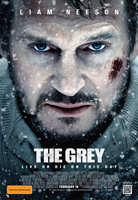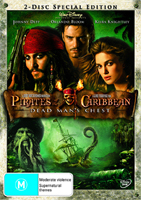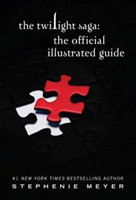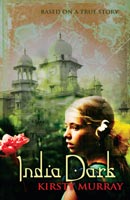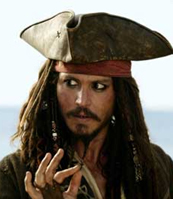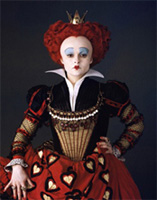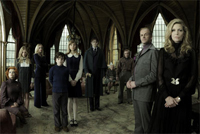Johnny Depp Transcendence
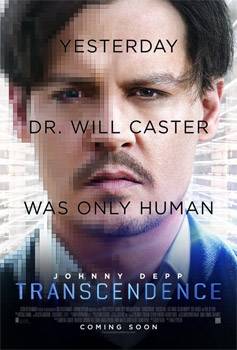
Johnny Depp Transcendence
Cast: Johnny Depp, Kate Mara, Morgan Freeman
Director: Wally Pfister
Genre: Action, Drama, Sci-Fi
Synopsis: Dr. Will Caster (Johnny Depp) is the foremost researcher in the field of Artificial Intelligence, working to create a sentient machine that combines the collective intelligence of everything ever known with the full range of human emotions. His highly controversial experiments have made him famous, but they have also made him the prime target of anti-technology extremists who will do whatever it takes to stop him.
However, in their attempt to destroy Will, they inadvertently become the catalyst for him to succeed"to be a participant in his own transcendence. For his wife Evelyn (Rebecca Hall) and best friend Max Waters (Paul Bettany), both fellow researchers, the question is not if they can… but if they should.
Their worst fears are realised as Will's thirst for knowledge evolves into a seemingly omnipresent quest for power, to what end is unknown. The only thing that is becoming terrifyingly clear is there may be no way to stop him.
Transcendence
Release Date: April 24th, 2014
About The Production
'Once online, a sentient machine will quickly overcome the limits of biology…its analytical power will be greater than the collective intelligence of every person born in the history of the world. Imagine such an entity with the full range of emotions, even self-awareness. I call it Transcendence."
Is Artificial Intelligence a threat to the way we live our lives today? Perhaps not yet, but what happens if we take it to the next level, if computers are given the capacity not only to think, but to feel?
Set in a not-too-distant future, 'Transcendence" explores the very real possibility that humans"in our attempts to create a better, more efficient, more self-sustaining world through technology"can go too far. For emotions are not always positive: doesn't a machine that has the capacity for kindness also have the capacity for menace? Wally Pfister, a renowned cinematographer making his feature directorial debut on the film, states, 'I was struck by the power and the weight of the ideas in this story, which I think are very much on people's minds right now."
'Transcendence" proposes that we can achieve what's been called singularity. Wally Pfister comments, 'As we define it for the film, singularity is basically the uploading of the human brain into a super computer: the duplication of every synapse, every neuron…every bit of activity in the brain goes into a machine, which then becomes sentient."
The film seeks to exemplify the coercive nature of the machines we create and how they control us as a culture. It is a path one could argue we are already on, and the film endeavors to project where we could be in 10 or 20 years as revolutionary, exciting…and equally troubling.
Johnny Depp stars as the scientist who not only provides the breakthroughs to make singularity"transcendence"possible, but whose brain becomes its first test subject. 'What I really found intriguing about this story was the idea that one man with a brilliant mind, a simple guy who adores his wife and does the crossword puzzle every morning, is able to take his expertise to the point where ego, power and passion could ultimately evolve him into something of a mechanical god."
Producer Andrew A. Kosove found the subject matter equally fascinating when he read the screenplay. 'I have always been interested in how advancing technologies impact people's lives. I thought that the writer, Jack Paglen, posed the question beautifully as to what defines a person versus an inanimate object, and he wrapped it up in a big, exciting action thriller."
Producer Broderick Johnson liked what he calls 'the juxtaposition of an action thriller with a very emotional, relatable core"the collision of technology with the human experience. But the idea that a loved one could be uploaded into a computer and you could then continue that relationship beyond its physical form was the heart of the film for me," he says.
'I love Jack Paglen's writing," producer Annie Marter relates, 'and I'd wanted to work with him for a long time. Then I read about singularity and was instantly gripped by the idea. I thought it was both captivating and scary and, surprisingly, not all that farfetched. Jack Paglen and I talked about it, and he agreed."
Jack Paglen, who for some time had been toying with the basic premise, developed the story by first speaking with his wife, a computer scientist. 'She's my secret weapon," he smiles. 'We talked out the sci-fi angle." Developing the idea with Marter, he continues, 'it all really came together with the idea of a woman trying to save her husband's life by any means possible, even if her only option was keeping him alive in a virtual way," he continues. 'That opened up a world of possibilities for me, and the emotional storyline humanises the actions of these characters while also allowing the audience to question them."
Jack Paglen pitched the concept to producers Kate Cohen and Marisa Polvino, who were instrumental in Wally Pfister coming on board to direct. 'Wally Pfister's vision and understanding of -Transcendence' aligned perfectly with what we found most compelling about the story and the deeper implications of technology in our society," Marsia Polvino states.
Kate Cohen agrees. 'We already knew Wally Pfister as an incredible cinematographer, but after meeting with him we knew he was the only one who could direct the film."
 Wally Pfister loved the screenplay, and sought additional information from several experts, including University of California, Berkeley's Dr. Jose Carmena, Professor of Electrical Engineering and Neuroscience, and Dr. Michel Maharbiz, Professor of Electrical Engineering, who served as technical consultants on the film. He also contacted former California Institute of Technology researcher Christof Koch, PhD, who is now Chief Scientific Officer with the Allen Institute for Brain Science in Seattle. Through his work with them and others, Pfister discovered that the script's scientific premises were not quite as fantastical as he originally thought. Progress in their various fields of research"neurosciences, nanotechnology, cell research and robotics"is slowly turning science fiction into fact.
Wally Pfister loved the screenplay, and sought additional information from several experts, including University of California, Berkeley's Dr. Jose Carmena, Professor of Electrical Engineering and Neuroscience, and Dr. Michel Maharbiz, Professor of Electrical Engineering, who served as technical consultants on the film. He also contacted former California Institute of Technology researcher Christof Koch, PhD, who is now Chief Scientific Officer with the Allen Institute for Brain Science in Seattle. Through his work with them and others, Pfister discovered that the script's scientific premises were not quite as fantastical as he originally thought. Progress in their various fields of research"neurosciences, nanotechnology, cell research and robotics"is slowly turning science fiction into fact.
Dr. Jose Carmena notes, 'I think the premise of the film is definitely inspiring and futuristic and, at the same time, forward-looking with respect to developments in brain-machine interfaces."
The filmmakers naturally took some dramatic license in order to serve the plot and the 'what-if" thriller aspect of the film. They also wanted to make what is an extremely intellectual study clear and accessible to the audience, and to provide a feeling of suspense and danger as the story progressed. However, as Michel Maharbiz says, 'Certainly it's a sci-fi movie, but the root of a lot of the issues discussed, especially in the first half of the film, are being researched in real time."
'Every day, these guys are pushing the frontiers of technology," says producer Aaron Ryder.
'It's exciting just to have a conversation with them. They were absolutely instrumental in helping us not only tell the story, but to understand the story we were telling with respect to the advancements in AI and singularity."
'Imagine your brain suddenly being able to connect to the Internet, to have access to every bit of information there"financial, medical, political…" Wally Pfister posits. 'What would you do with that kind of knowledge, that kind of ultimate power? Would you use it for the greater good, or your own gain, or something else entirely? This film gives moviegoers a chance to see the possibilities and wonder if it's a choice they'll ever have to face."
'What is the nature of consciousness?
Is there a soul? And, if so, where does it reside?"
Dr. Will Caster, a brilliant researcher, has spent decades trying to harness the full potential of Artificial Intelligence, and years building a potentially sentient computer dubbed PINN (Physically Independent Neural Network), designed to process history's collective knowledge and marry it with an uploaded conscious mind, including its complete range of emotions. On the verge of a breakthrough, Will is gunned down"the latest target of Revolutionary Independence From Technology, or RIFT, an extremist organization whose motto is Evolution without Technology. They will stop at nothing, including murder, to halt humankind's ever-growing dependence on technology and its influence on our world, and the damage they inflict on Will's body is fatal. But what of his heart and mind?
Their attempt to stop Will Caster's research backfires, providing the very opportunity for the realisation of what they fear the most, and inadvertently leads to the ultimate test of Will's hypothesis. Will's wife, Evelyn Caster, a fellow computer scientist, will not allow death to take the love of her life. She enlists their best friend, neurobiologist Dr. Max Waters, to help 'save" her husband in the only way they can: by uploading Will into PINN, thereby achieving transcendence. If they succeed, the possibilities are infinite…but so may be the dangers.
The filmmakers knew they needed a compelling actor to play a role that required him to be a largely virtual presence for much of the film. They were thrilled to have Johnny Depp create the character of Will.
'Johnny Depp is an intelligent man, so he plays that very comfortably, and that was important," Wally Pfister says. 'But he also brings a warmth and charisma that are undeniable on screen. He's a great communicator and a joy to work with as well."
The seasoned Johnny Depp found the first-time director 'incredibly collaborative, very open. His approach to each shot was not only technically appealing, thanks to his background behind the camera, but there was real poetry and emotion in the way he saw each scene playing out and they way he wanted to tell the story. I think he really made a seamless transition."
Turning to his character, Johnny Depp says, 'Will's a good guy who has the world's best interests at heart in trying to achieve transcendence. But because he becomes so powerful, has access to basically all the information on the Internet and believes in his own methods, it becomes very hard to stop him. Anyone with that much control, even with what may be the best of intentions, well…there will always be those who see things differently. In Will's case, it seems like it may be too late to stop him."
The dilemma for both Evelyn and Max is in believing whether the voice and image emanating from PINN are actually Will's heart and soul…or neither. Beyond that they are forced to consider his curious directives and intentions: are they truly benevolent as they seem, or are they part of a sinister master plan he is withholding?
'The relationship that Will and Evelyn have is one of mutual respect and passion," Johnny Depp offers. 'There's nothing about one that the other isn't totally fascinated with. He loves that she's totally brilliant and can relate to him on every level."
How far would you go to save a loved one, a soul mate, who is dying right before your eyes? Is it a philosophical or a moral choice, or just a gut instinct? Evelyn is too blinded by love and loss to make an objective decision. To see Will's life's work go to waste is one thing, but to waste the chance to hold onto him is unthinkable. And if, in the process, she can see to it that his life's work is fulfilled and perhaps keep him alive forever…that is irresistible to her.
Actress Rebecca Hall plays Evelyn, who, she says, 'had to be a very strong and dynamic force at the center of this story, and make some fairly complicated decisions. I suppose if she wasn't in a position where her emotions were so heightened, she'd have more of an ethical dilemma about what she does. But she's grieving for her husband, so those issues become lessened for her; she doesn't examine them in the same way she would under different circumstances."
Despite Evelyn's questionable actions as a grief-stricken widow, Rebecca Hall found her character's goals as a scientist to be more than admirable. 'She wants to make a better future, to heal big problems like disease and the environment and so many other concerns the planet is facing. Her vision gets fast-tracked"and possibly off-track"by these unforeseen circumstances."
'Rebecca Hall's character really gets beat up emotionally in the picture," Wally Pfister says. 'She goes to hell and back, and Rebecca Hall did a phenomenal job."
Hall was happy to work out the intricate nuances of her character's journey with Wally Pfister, whom she'd first met on the set of 'The Prestige." 'I had never worked with a first-time director who has as much experience as Wally Pfister. He had all the enthusiasm and optimism of someone new, and the understanding of someone who's been doing it for years and knows everything about it."
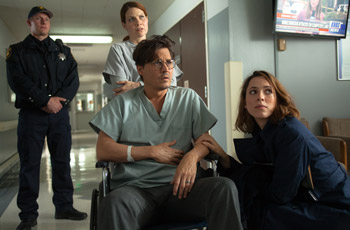 Producer Kate Cohen observes, 'This unrelenting love story got to me; the idea of Evelyn holding onto Will in any and every way she can"even living with him underground, in a computer screen"just so she can still feel like she's with him. She's let go of any possibility of moving on with her life, and he can't let her go, either. I'm a hopeless romantic, and the tragic love between these two characters was what really drew me to the project."
Producer Kate Cohen observes, 'This unrelenting love story got to me; the idea of Evelyn holding onto Will in any and every way she can"even living with him underground, in a computer screen"just so she can still feel like she's with him. She's let go of any possibility of moving on with her life, and he can't let her go, either. I'm a hopeless romantic, and the tragic love between these two characters was what really drew me to the project."
The third person in this love story is Dr. Max Waters, played by Paul Bettany. With Will's death, Max is also left to grieve the loss of one of his closest friends. He is also the only one who can help Evelyn fulfill the destiny she sees for Will by attempting his transcendence.
Although he is a willing participant, there is a fundamental difference of opinion between them: Max believes there must be appropriate limitations to technology, and that it ought to aid human beings, not supplant the human mind. Thus when Will's transcended consciousness"if indeed it is Will"begins to expand and absorb an infinite amount of knowledge, Max fears it will lead him to become a controlling, omniscient presence. And to what end, Max cannot fathom.
To play a neurobiologist, Paul Bettany did his homework. 'I read a book called Consciousness, which is just extraordinary, and then I went to meet the author, who's a brain scientist. I walked into the room and he was looking at brain scans and listening to Wagner," Paul Bettany smiles. 'I said, -Um, Professor Koch?' And he held up his hand so I wouldn't speak until, you know, the aria was finished."
Paul Bettany discussed his character at length with Wally Pfister, particularly the connection between Max, Will and Evelyn. 'I really liked that at the center of this story about our dependence on technology and computers and the potential benefits and repercussions of that, was this really complicated relationship between these three best friends," he says. 'Will and Evelyn are married, but I felt there was a slight sort of unrequited love for Evelyn somewhere deep down in Max, which I thought added to the heart of the film in a beautiful way."
'Paul Bettany is an extraordinary actor," Wally Pfister remarks. 'Max has an emotional ride in this movie from beginning to end and Paul Bettany really brought so much to his performance. I was delighted to have him in the part."
In the film, Will, Evelyn and Max have all known each other since they studied under Professor Joseph Tagger. Still close with their mentor, the four are brought together early in the story when Joseph Tagger and his team are targeted by RIFT.
Morgan Freeman, who portrays Tagger, says, 'I play an old computer expert who's been working for years to develop artificial intelligence. He's supportive of Will and Evelyn's work, too, but he's also mindful that -absolute power corrupts absolutely.' You can't put that much power in one person's hands because, however good that one person is, however much good they want to do, they could wind up doing more harm than good."
The busy actor was eager to work with Johnny Depp. 'I would've read the phone book," he jokes. 'Johnny Depp knows what he wants and how to achieve it with no histrionics. It's a very subtle performance."
Morgan Freeman was also happy to see Wally Pfister in a different role, having worked with him several times as a DP. 'One of Wally Pfister's biggest assets is he listens. He listens very well, and that's really important."
Tagger narrowly escapes death, though others, including Will, are not so lucky. Kate Mara plays Bree, the extremist group's leader, whose commitment to her anti-technology ideology knows no limits.
'Wally Pfister and I talked a lot about what might've brought Bree to this place in her life, what would cause someone to start out with very good intentions about keeping the environment safe to go so far as to start killing people," Kate Mara offers. 'What we discover about her in the film is that she has seen firsthand the potential dangers of AI experimentations while working in a lab. Obviously it affected her in such a way that drove her to the other side."
'We are evolving into this society that is so reliant on computers and texting that personal relationships are dissipating," says producer Marisa Polvino. 'We really wanted to question whether that's good or bad, will it be our demise? RIFT felt like the kind of radical group that would arise from those fears and makes it hard to determine whether to agree or disagree with them."
Once hallmarks of a terrorist group emerge, the FBI becomes involved. Cillian Murphy stars as Agent Buchanan, who initially leads the charge in protecting theAI scientists from further attacks by RIFT, and later has to focus his attentions on Will.
Cillian Murphy says, 'Agent Buchanan may not be exactly sure what Will's ultimate purpose is once he's garnered so much control, but being an agent of the government, he knows he can't allow it to go any further, so he'll do whatever is necessary to shut him down."
Like Morgan Freeman, Cillian Murphy is a veteran of several film sets with Wally Pfister. 'I was thrilled when Wally Pfister called me up and said he had a part for me and would I be interested," the actor recalls. 'I always want to work with people I admire and have a prior relationship with, and he's such a tremendously talented guy. I told him to count me in right away."
Rounding out the cast are Cole Hauser as Colonel Stevens, who assists Buchanan on the hunt for Will; Clifton Collins, Jr., as Martin, who helps Will further his goals; and Lukas Haas as a dangerous member of RIFT.
'To be surrounded by such an incredible group of actors was amazing," Wally Pfister says. 'And we had fun every day"there wasn't a day on that set that we weren't enjoying ourselves as we were hunkering down and getting to the work at hand."
'The Internet promised to expand our horizons, to make the world a smaller place… Maybe it was all inevitable, an unavoidable collision between mankind and technology."
Filmed in Los Angeles and New Mexico, 'Transcendence" takes place in a variety of settings, from the urban streets of Berkeley, California, to a dying desert town and a forested mountain hideout. Production designer Chris Seagers worked closely with Pfister, director of photography Jess Hall, and visual effects supervisor Nathan McGuinness to create the desired look and feel for the movie.
'We had a fantastic crew comprised of artists who were all very interested in the subject matter and excited to be part of it," Wally Pfister says. 'My experience has made me appreciate streamlined sets married with interesting visual effects and an overall naturalistic style, and they were able to create exactly what I'd envisioned."
'Wally Pfister always had a very clear idea of what he wanted," Chris Seagers says, 'but then he let us run with it and really embraced our work."
Chris Seagers notes that, from his perspective, 'it turned out to be a slightly unusual project, in that the look itself transcends from the traditional and familiar to an almost disturbingly sterile world that doesn't need humans, but just runs itself. So we started with the humans that built the place, and then began to present less and less humanity."
The set he refers to is a compound in the fictional remote desert town of Brightwood, called the Brightwood Data Center. Built by locals hired by Evelyn at her husband's direction, it is a primarily underground facility where the ever-evolving Will is able to continually expand his scope of knowledge, accessing and merging with every hard drive in the world. The set was created on stages in Albuquerque and, according to Chris Seagers, required long corridors to accommodate Wally Pfister's vision. Luckily, much of what they needed was already there. 'Wally Pfister wanted something that felt both not of this world, but not purely science fiction either," Chris Seagers says. 'The stages off I-25 in New Mexico were perfect because they had low ceilings and very flat concrete floors, and very, very long corridors"one was 300 feet long"so we could shoot everything practically, which he likes to do as much as possible."
The exterior of Brightwood was filmed in the city of Belen, where Chris Seagers' team constructed five buildings and a number of trailer homes. The 'town" was designed, drawn and built in just eight weeks, and the people of Belen were very accommodating to the production, which basically took over their town for the duration of their time there. In addition, the visual effects team, under the supervision of McGuinness, used green screens to give the town the remote desert atmosphere desired.
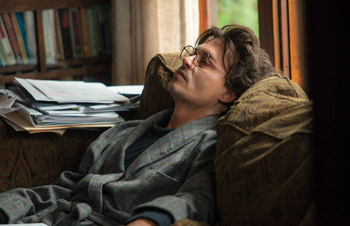 In Rio Puerco, the production built a solar field where many of the film's action sequences take place. Chris Seagers was prepared to shoot in a real solar field, but quickly realised that it wouldn't be safe to do the required explosions and stunts there. 'In the end," he says, 'we decided to make our own, taking what is available today and giving it a slightly more skeletal structure. And we did everything in black-and-white to give it a very stark look."
In Rio Puerco, the production built a solar field where many of the film's action sequences take place. Chris Seagers was prepared to shoot in a real solar field, but quickly realised that it wouldn't be safe to do the required explosions and stunts there. 'In the end," he says, 'we decided to make our own, taking what is available today and giving it a slightly more skeletal structure. And we did everything in black-and-white to give it a very stark look."
The film opens in Berkeley, where Chris Seagers says, 'it's all very Northern California wood tones, but urban. When we see RIFT's headquarters, which is also in the woods, it's all natural"in fact, because they are anti-technology, everything there is very simple, analog-based, and so we used the Luddites for inspiration.
The film's color palette transitions as the story moves to the desert. 'Once we get to the BDC," he continues, 'it's very neutral with a lot of glass, so it's also reflective and translucent." The translucency plays out at its height in Evelyn's Brightwood residence, where Will also resides in his virtual world, and his image appears everywhere she looks. 'That was a tricky set to work out, because the whole thing was done by back projections, so it was getting reflections on the reflections. The danger was that it could become a big mirror box, so we had to play with texture and structure to get it to work."
'The design and effects teams and our DP, Jess Hall, came up with an incredible way to keep Johnny Depp present in the scenes after his character's body dies and his mind is uploaded," Kosove says. 'They had Johnny Depp on set, acting right there with Rebecca, but his performance was being projected into the wall. So, instead of shooting his performance later against a green screen, we have the authenticity of him being there in the moment. I think the result is not only visually stunning, but emotionally truthful as well."
Jess Hall sought inspiration for this technique from contemporary video artist Bill Viola. 'His work related to what we were doing because we were working so intensely with camera projection, and that's something he mastered in the gallery space," Jess Hall says. 'I went back and looked at the way he projects onto different materials, and then we did some experimenting and finally came up with the way we wanted to do it for the film."
Jess Hall shot the movie on 35mm film with a photochemical finish. 'It has wonderful depth, color saturation and contrast. You can achieve an intensely rich, yet subtle and realistic texture," he says. 'You know you're working with light and emotion, not ones and zeros, and I love the way it captures the faces and skin tone of the actors."
In addition to providing the computerized world in which Will resides, McGuinness's effects team enhanced and extended the sets wherever necessary, especially on the larger builds, such as the solar fields and BDC.
'No matter how much was actually built for the set, when you're in the desert even 400 solar panels would have felt small," McGuinness reasons. 'We built 75, shot all the action inside of those, and then created the rest to extend as far as the eye could see."
However, McGuinness points out that the visual effect that was most specific to 'Transcendence" was much more connected to the character of Will Caster and his evolving abilities, 'in order to serve the overall concept of the film. The technology being designed and implemented by Will was a permeating extension of what he had become. It could be organic, metal, solid, liquid, or a combination of all of that. For instance," he says, referencing one of the most difficult effects, 'what would reverse rain look like? We had to figure all of that out and so much more, down to the smallest detail."
Johnson observes, 'Johnny Depp's character goes from a humble man of science in a modest home to an omnipresent artificial intelligence that manages to overtake the entire Internet. Whether or not he's a benevolent or malevolent being, we needed the audience to feel his presence in every frame of the film."
The filmmakers and cast reflect that the movie poses some profound questions within its sci-fi storyline, and raises some thought-provoking scenarios about the effects that advancing, evolving technologies might have on our culture and on us as individuals.
'People have been fighting wars over -my god is better than your god' for thousands of years," Johnny Depp says. 'In the 21st century, I think it's appropriate to look at the way human beings worship technology and what that could mean for our future.
Whether you're on the side of technology or ecology, a pacifist or an extremist, most people have very definite opinions, and the question of how far we should allow our dependence on computers to go is a question that needs to be asked."
Wally Pfister summarizes, 'According to the experts, artificial intelligence of the sort we present in -Transcendence' is coming, like it or not. What I wanted to do with the film is give people a peek into one direction our world could take in the coming decades, and engage them in an emotional, moral and intellectual debate about this very timely topic in a way that is both thought-provoking and entertaining."
Transcendence
Release Date: April 24th, 2014
Have You Seen This?
MORE
- Mission: Impossible Fallout
- Glenn Close The Wife
- Allison Chhorn Stanley's Mouth Interview
- Benicio Del Toro Sicario: Day of the Soldado
- Dame Judi Dench Tea With The Dames
- Sandra Bullock Ocean's 8
- Chris Pratt Jurassic World: Fallen Kingdom
- Claudia Sangiorgi Dalimore and Michelle Grace...
- Rachel McAdams Disobedience Interview
- Sebastián Lelio and Alessandro Nivola...
- Perri Cummings Trench Interview



